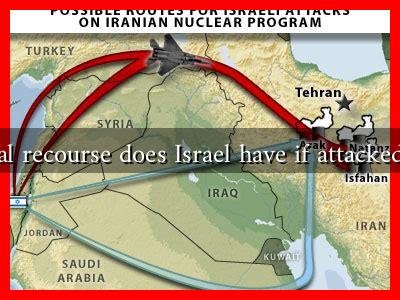-
Table of Contents
What Legal Recourse Does Israel Have If Attacked by Iran?
The geopolitical landscape of the Middle East is fraught with tension, particularly between Israel and Iran. As Iran continues to develop its military capabilities and nuclear program, the potential for conflict raises critical questions about the legal recourse available to Israel in the event of an attack. This article explores the legal frameworks, international laws, and potential responses that Israel could invoke if faced with aggression from Iran.
Understanding the Legal Framework
International law provides a complex framework for state behavior, particularly concerning acts of aggression. The primary sources of international law relevant to this discussion include:
- The United Nations Charter: This foundational document outlines the principles of state sovereignty and the prohibition of the use of force, except in self-defense or with UN Security Council authorization.
- Customary International Law: Established practices and norms that have developed over time, which can influence state behavior and legal interpretations.
- Treaties and Bilateral Agreements: Specific agreements between states that may outline mutual defense obligations or other cooperative measures.
Self-Defense Under International Law
Article 51 of the UN Charter explicitly recognizes the right of states to defend themselves against armed attacks. This provision is crucial for Israel, as it provides a legal basis for military action in response to an attack from Iran.
. The key points regarding self-defense include:
- Immediate Response: Israel can respond immediately to an armed attack, provided that the response is proportional and necessary.
- Preemptive Strikes: While controversial, some legal scholars argue that preemptive self-defense may be justified if there is an imminent threat. Israel has historically invoked this principle in its military operations.
- Reporting to the UN: Following any military action, Israel would be expected to report to the UN Security Council, justifying its actions under the self-defense clause.
International Support and Alliances
Israel’s legal recourse is also influenced by its relationships with other nations, particularly the United States and European allies. These alliances can provide both military and diplomatic support in the event of an attack. Key aspects include:
- Military Aid: The U.S. provides significant military assistance to Israel, which could be mobilized in response to an Iranian attack.
- Diplomatic Backing: Strong diplomatic ties can lead to international condemnation of Iran’s actions, potentially leading to sanctions or other punitive measures.
- Joint Defense Agreements: Existing agreements may obligate allies to support Israel in the event of an attack, enhancing its legal and military position.
Case Studies: Historical Precedents
Israel’s history of conflict with its neighbors provides several case studies that illustrate its legal recourse in times of war. Notable examples include:
- The Six-Day War (1967): Israel launched a preemptive strike against Egypt, Jordan, and Syria, citing imminent threats. The international community’s response was mixed, but Israel’s actions were largely justified under self-defense.
- The 1981 Osirak Strike: Israel targeted Iraq’s nuclear reactor, arguing that it was a preemptive measure to prevent a future threat. This action remains controversial but is often cited in discussions of preemptive self-defense.
Potential Consequences of Military Action
While Israel has legal recourse to respond to an attack, military action carries significant risks and consequences:
- Escalation of Conflict: Military responses can lead to broader regional conflicts, drawing in other nations and destabilizing the area.
- International Condemnation: Depending on the circumstances, Israel may face backlash from the international community, particularly if its actions are perceived as disproportionate.
- Legal Challenges: Israel could face legal challenges in international courts, such as the International Criminal Court (ICC), if its actions are deemed unlawful.
Conclusion
In summary, Israel has several legal avenues available if attacked by Iran, primarily grounded in the right to self-defense under international law. The complexities of international relations, alliances, and historical precedents further shape Israel’s potential responses. However, any military action carries inherent risks, including escalation and international scrutiny. As tensions continue to simmer in the region, understanding these legal frameworks is crucial for anticipating future developments in Israeli-Iranian relations.
For further reading on international law and self-defense, you can explore resources from the United Nations.





